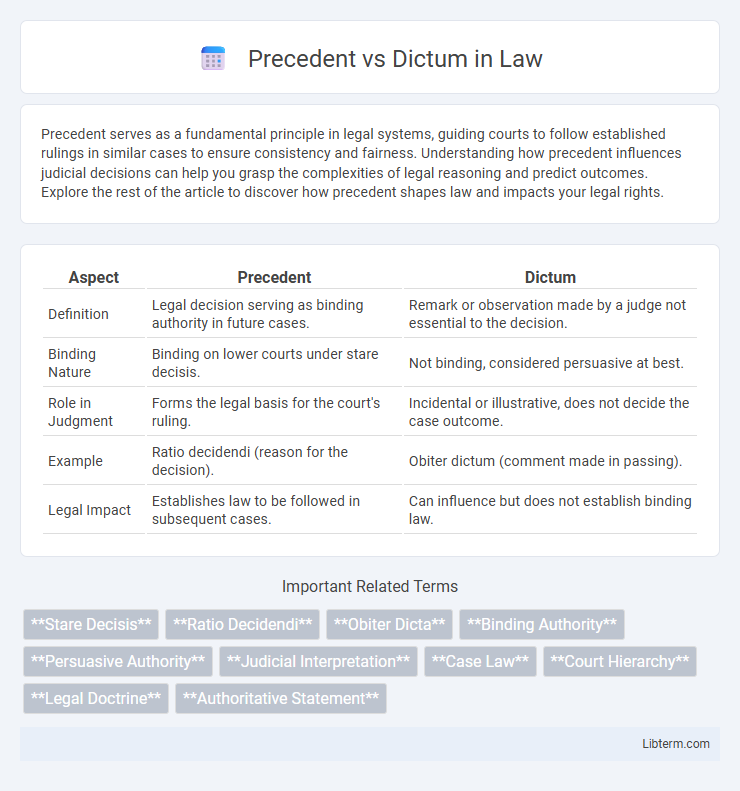Precedent serves as a fundamental principle in legal systems, guiding courts to follow established rulings in similar cases to ensure consistency and fairness. Understanding how precedent influences judicial decisions can help you grasp the complexities of legal reasoning and predict outcomes. Explore the rest of the article to discover how precedent shapes law and impacts your legal rights.
Table of Comparison
| Aspect | Precedent | Dictum |
|---|---|---|
| Definition | Legal decision serving as binding authority in future cases. | Remark or observation made by a judge not essential to the decision. |
| Binding Nature | Binding on lower courts under stare decisis. | Not binding, considered persuasive at best. |
| Role in Judgment | Forms the legal basis for the court's ruling. | Incidental or illustrative, does not decide the case outcome. |
| Example | Ratio decidendi (reason for the decision). | Obiter dictum (comment made in passing). |
| Legal Impact | Establishes law to be followed in subsequent cases. | Can influence but does not establish binding law. |
Understanding Precedent: Definition and Importance
Precedent refers to a legal principle or rule established in a previous court decision that is binding on lower courts within the same jurisdiction. It ensures consistency, predictability, and stability in the law by guiding judges to decide current cases based on past rulings. Understanding precedent is crucial for legal professionals to interpret laws accurately and apply judicial reasoning effectively.
What is Dictum? Clarifying the Concept
Dictum refers to a statement or observation made by a judge in a legal opinion that is not essential to the decision and does not establish binding precedent. It is considered persuasive rather than mandatory authority because it addresses issues beyond the facts or legal questions directly before the court. Understanding dictum clarifies its role as guidance that can influence future cases without compelling courts to follow it as precedent.
Key Differences Between Precedent and Dictum
Precedent refers to a judicial decision that establishes a legal principle or rule binding on lower courts under the doctrine of stare decisis, while dictum (or obiter dictum) consists of remarks or observations made by a judge that are not essential to the decision and thus not legally binding. Precedents serve as authoritative guides in future cases, ensuring consistency and predictability in the law, whereas dicta provide persuasive but non-binding commentary that may influence but do not control later rulings. The key difference lies in their binding nature: precedent is mandatory, whereas dictum is advisory or informative only.
Types of Judicial Precedents
Judicial precedents are categorized into binding precedent and persuasive precedent, where binding precedent, or ratio decidendi, refers to the legal principle essential to the court's decision and must be followed by lower courts. Dictum, or obiter dictum, represents statements or observations made by a judge that are not crucial to the decision and do not hold binding authority but may influence future rulings. Understanding the distinction between ratio decidendi and obiter dictum is vital in legal research and interpreting case law for setting precedents.
The Legal Authority of Precedent vs Dictum
Precedent holds binding legal authority as it consists of previous court decisions that must be followed by lower courts within the same jurisdiction, ensuring consistency and predictability in the law. Dictum, or obiter dictum, refers to statements made by a judge that are not essential to the decision and therefore carry persuasive but not binding authority. The distinction between precedent and dictum is critical: precedent establishes mandatory rules, while dictum provides guidance or insight without obligating future courts.
How Courts Use Dictum in Legal Reasoning
Courts use dictum as persuasive authority rather than binding precedent, often referencing it to clarify legal principles or explore hypotheticals beyond the case's holding. While precedent establishes mandatory legal rules derived from the ratio decidendi, dictum provides interpretive guidance that can influence future judicial decisions without the force of law. Legal reasoning leverages dictum to understand judicial perspectives and support arguments when precedent lacks direct applicability.
The Role of Obiter Dicta in Judicial Decisions
Obiter dicta, though not binding like precedent, play a significant role in judicial decisions by providing persuasive insights and guiding principles for future cases. Judges often reference obiter dicta to clarify legal reasoning, explore hypothetical scenarios, and suggest potential developments in the law. These statements, found in judicial opinions beyond the ratio decidendi, contribute to the evolving landscape of case law by influencing both lower courts and later judgments.
Landmark Cases Illustrating Precedent and Dictum
Landmark cases such as *Brown v. Board of Education* serve as pivotal precedents, establishing binding legal principles that lower courts must follow. In contrast, dictum statements from cases like *Dred Scott v. Sandford* provide persuasive commentary or observations not essential to the final decision, thus lacking binding authority. Understanding the distinction between precedent and dictum is crucial for interpreting judicial rulings and their applicability in subsequent cases.
Challenges and Controversies Involving Dictum
Challenges involving dictum arise from its non-binding nature, causing debates over its persuasive value in court decisions. Unlike precedent, dictum lacks obligatory authority, leading to inconsistent application and interpretive disputes among judges. Controversies often stem from whether dictum statements should influence future rulings or remain mere commentary without legal effect.
Practical Implications for Lawyers and Judges
Precedent refers to binding legal principles established by higher courts that lower courts must follow, ensuring consistency and predictability in judicial decisions. Dictum, or obiter dictum, consists of remarks or observations in a judgment not essential to the case outcome, carrying persuasive but non-binding authority. Lawyers and judges must prioritize precedent for case strategy and rulings while considering dictum for potential guidance or insight into legal reasoning.
Precedent Infographic

 libterm.com
libterm.com